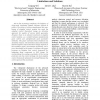Free Online Productivity Tools
i2Speak
i2Symbol
i2OCR
iTex2Img
iWeb2Print
iWeb2Shot
i2Type
iPdf2Split
iPdf2Merge
i2Bopomofo
i2Arabic
i2Style
i2Image
i2PDF
iLatex2Rtf
Sci2ools
IPPS
2005
IEEE
2005
IEEE
The Applicability of Adaptive Control Theory to QoS Design: Limitations and Solutions
Due to the increasing complexity, the behavior of large-scale distributed systems becomes difficult to predict. The ability of on-line identification and autotuning of adaptive control systems has made the adaptive control theoretical design an attractive approach for quality of service (QoS) guarantee. However, there is an inherent constraint in adaptive control systems, i.e. a conflict between asymptotically good control and asymptotically good parameter estimates. This paper addresses these limitations via sensitivity analysis. The simulation study demonstrates that the adaptive control theoretical design depends on the excitation signal, environment uncertainty, and a priori knowledge on the system. In addition, this paper proposes an adaptive dual control framework for mitigating these constraints in QoS design. By incorporating the existing uncertainty of the on-line prediction into the control strategy, the dual adaptive control framework optimizes the tradeoff between the cont...
Adaptive Control | Adaptive Control Systems | Control Theoretical Design | Distributed And Parallel Computing | IPPS 2005 |
| Added | 25 Jun 2010 |
| Updated | 25 Jun 2010 |
| Type | Conference |
| Year | 2005 |
| Where | IPPS |
| Authors | Keqiang Wu, David J. Lilja, Haowei Bai |
Comments (0)

